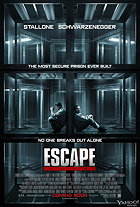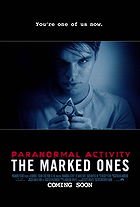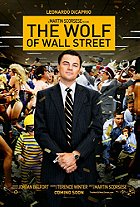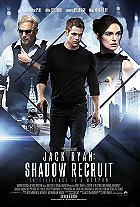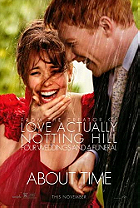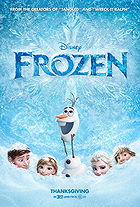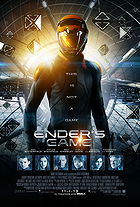Grudge Match seems like an odd career choice for Sylvester Stallone, who seems determined to do as many old-school action movies as possible before the aging actor's bones give out. Yet here's a boxing dramedy directed by Peter Segal, who was last seen behind Get Smart and a couple of Adam Sandler movies. Thankfully, however, Grudge Match is a home run against all odds; a perfect feel-good flick which is funny and heartfelt in equal measures. The gimmick at the centre of the production, of course, is the fact that it pits Stallone against Robert De Niro, staging a boxing bout between Rocky Balboa and the Raging Bull at long last. Yet, Grudge Match doesn't call it a day with the gimmick in place; this is a mighty fine movie filled to the gills with hilarious dialogue, not to mention it has an interesting story at its core.

In the 1980s, big-time boxers Henry "Razor" Sharp (Stallone) and Billy "The Kid" McDonnen (De Niro) were rivals. After two fights in the ring which left both men with one victory each, a tie-breaking grudge match was planned to determine who's the best. But Razor unexpectedly retires from boxing before the fight, leaving the score unsettled, which eats away at The Kid for thirty years. Now a blue collar worker in Pittsburgh, Razor is struggling to make ends meet, trying his best to maintain a living while caring for his former trainer, Lightning (Alan Arkin). After someone films The Kid and Razor having a scuffle, the video goes viral on the internet, prompting down-and-out boxing promoter Dante Slate, Jr. (Kevin Hart) to convince the former boxers to finally have it out in the ring one last time. Although Razor is extremely reluctant, he needs the monster payday, and agrees to the long overdue grudge match. Thus, the two men lock into a regime of training and public appearances to promote the fight, all the while dealing with various personal troubles. As The Kid finally bonds with his adult son B.J. (Jon Bernthal), Razor reconnects with beloved ex-girlfriend Sally (Kim Basinger).
The result is about as clichéd as it sounds, but what's unexpected is the level of wit and sensitivity that's allotted to what would otherwise be a stale, paint-by-numbers comedic distraction. One of the more successful aspects of the story is The Kid's relationship with B.J., the son that he never knew. Rather than the customary arc of the two warming up to each other over time, they like one another almost immediately, which makes the relationship feel more real than it might have otherwise been. Moreover, Grudge Match portrays Grudgement Day as a publicity stunt, just as so many will perceive the movie itself as a gimmick for its two stars. While the bout is significant to The Kid and Razor, pretty much everyone else sees it as some stupid joke - even the press conference for the match is filled with reporters who ask mocking questions. It's smart scripting by Tim Kelleher and Rodney Rothman who also pack the movie with plenty of laughs. It's surprising just how hilarious Grudge Match is. From start to finish, the script serves up a steady stream of sharp one-liners and hysterical bantering which had this reviewer sobbing with laughter on more than one occasion. It's very funny.

Director Segal does not have a great deal of credibility as a filmmaker, but he was an ideal choice for the director's seat, and this is definitely his best work to date. Segal was clearly aiming for a Rocky aesthetic here, with handheld cinematography and a colour palette resembling 2006's Rocky Balboa. Grudge Match is energetic, too, with enjoyable soundtrack choices and brisk pacing. Most movies of this ilk try too hard in the dramatics department, resulting in jarring tonal shifts. But Segal has a surprisingly good grasp of this material, and the more dramatic aspects of the story do not weigh down the pacing or turn the experience into a leaden bore. On the contrary, the picture is handled with briskness and maturity, and there's a very engaging human story underneath. Indeed, Grudge Match does not live and die by its laughs. Who knew Segal could evoke genuine emotion, maintain an agreeable pace, juggle tonal shifts, and handle a boxing match with style?
Stallone and De Niro rehearsed extensively for the climactic fight, and the results are magnificent. Segal plays it straight, staging a believable, exciting fight between the two geriatrics, who indeed show up in great shape. This is the leanest that Sly has been since Rocky III, and De Niro still looks like he could kill someone with his sheer strength. Both men also build up a certain amount of sympathy, to the point that there's no good or bad guys here, and we don't really have a burning desire to see either man win or lose. The fight is not one-sided, and the outcome is completely fair to both competitors. Segal had a big advantage with De Niro and Stallone, as plenty of footage and images exist of the two actors from the 1980s, allowing for an authentic portrayal of the rise and fall of their roles. However, digital effects were used to de-age the actors for their '80s boxing matches, and the results are slightly on the iffy side.

It's also surprising just how good all of the performers are, and how strong the characters are. Stallone has tried his hand at comedy before, but let's never speak about those endeavours again. Here, the veteran star is in fine form, displaying spot-on comedic timing and delivery. Moreover, he shares wonderful chemistry with De Niro, who clearly had an absolute ball playing a real character, rather than sleepwalking for the paycheque. It's a shame it took so long for Stallone and De Niro to star in a movie together, as they light up the screen and their banter literally sparkles. Fortunately, the men are surrounded by an able supporting cast. Garnering plenty of laughs is Arkin, yet again demonstrating his pitch-perfect comedic instincts. Arkin has a field day here with one-liners, and his dialogue and actions are a consistent source of amusement. Hart, meanwhile, is a lot funnier than he should be, proving his worth alongside the veterans. Also impressive is Basinger who looks mighty fine for a sixty-year-old. And finally, there's Jon Bernthal who's fast emerging as an unexpectedly great actor. Bernthal is warm and believable here, and his performance is the very antithesis of his vicious work in Martin Scorsese's The Wolf of Wall Street.
Screw the critics - Grudge Match is a very good movie which flirts with greatness. It's a harmless, enjoyable crowd-pleaser with a great cast and a fun premise. Even if you don't laugh at the movie (and if this is the case, what the hell is wrong with you?), there's still a great story to enjoy here, and Segal imbues the material with heart and gravitas. Yeah, it lacks the emotional impact of Rocky, and the comedy might've been sharper with the freedom of an R rating, but the movie is still a lot better than it had a right to be. It's a real keeper.
7.7/10
 Login
Login
 Home
Home 183 Lists
183 Lists 1668 Reviews
1668 Reviews Collections
Collections
 0 comments,
0 comments, 